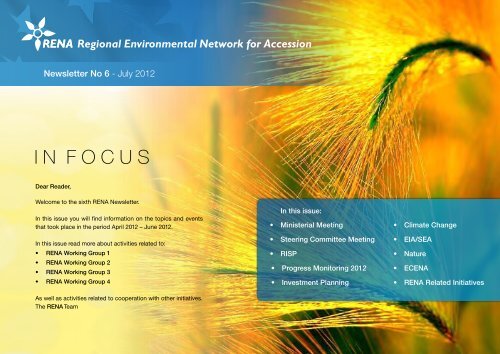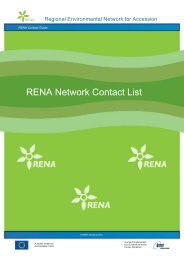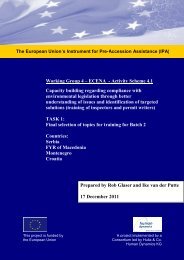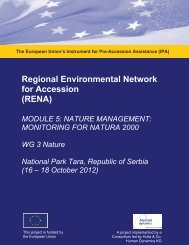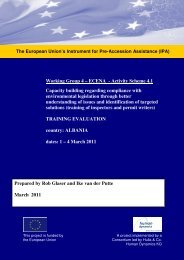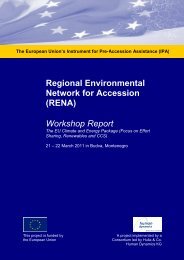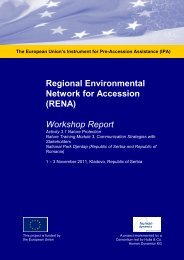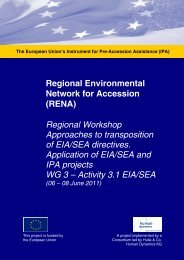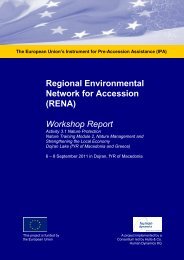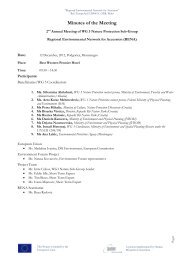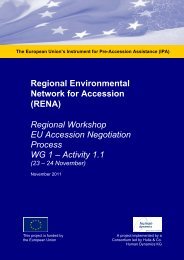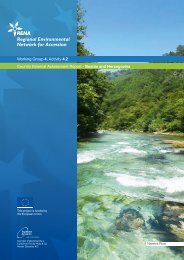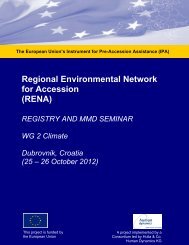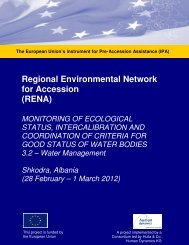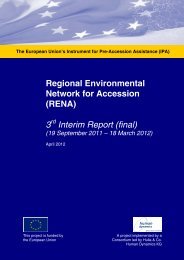RENA Newsletter 6_July.pdf - Renanetwork.org
RENA Newsletter 6_July.pdf - Renanetwork.org
RENA Newsletter 6_July.pdf - Renanetwork.org
You also want an ePaper? Increase the reach of your titles
YUMPU automatically turns print PDFs into web optimized ePapers that Google loves.
<strong>Newsletter</strong> No 6 - <strong>July</strong> 2012I N F O C U SDear Reader,Welcome to the sixth <strong>RENA</strong> <strong>Newsletter</strong>.In this issue you will find information on the topics and eventsthat took place in the period April 2012 – June 2012.In this issue:In this issue read more about activities related to:• <strong>RENA</strong> Working Group 1• <strong>RENA</strong> Working Group 2• <strong>RENA</strong> Working Group 3• <strong>RENA</strong> Working Group 4As well as activities related to cooperation with other initiatives.The <strong>RENA</strong> Team
SteeringCommitteeMeetingPREPARATIONS FOR THEMEETING OF ENVIRONMENTMINISTERS OF CANDIDATECOUNTRIES AND POTENTIALCANDIDATES4 th <strong>RENA</strong> STEERINGCOMMITTEE MEETINGThe meeting was held in Dures, Albania on 4 April 2012. Project team and <strong>RENA</strong> Secretariatpresented the overview of activities implemented by the project in the period September2011 – March 2012. The work plan for the period March 2012 – September 2012 has beendiscussed and agreed.Meeting of Environment Ministers of Candidate Countries and Potential Candidates in theframe of the Regional Environmental Network for Accession will be held in Brussels on 25September 2012.The objectives of the <strong>RENA</strong> Ministerial meeting is to provide an opportunity to discuss theshape, content and priority areas of the new regional programme named Environment andClimate Regional Accession Network (ECRAN) which will be put forward for discussionand endorsement, drawing on the <strong>RENA</strong> experience and results. It is expected that oneof the outcomes of the <strong>RENA</strong> Ministerial Meeting will be a Joint Statement on the futurerole of regional cooperation for the transposition and implementation of the environmentand climate acquis.The <strong>org</strong>anisation of the meeting will be supported by the <strong>RENA</strong> Secretariat.<strong>RENA</strong> <strong>Newsletter</strong> No 6 - <strong>July</strong> 2012 2
RISP<strong>RENA</strong> WG 1 RISPWorking Group 1 – Regional Workshop on Protection of the Environmentthrough Environmental LawEnvironmental crime can be broadly defined as illegal acts which directly harm theenvironment. They include: illegal trade in wildlife; smuggling of ozone-depletingsubstances (ODS); illicit trade in hazardous waste; illegal, unregulated, andunreported fishing; and illegal logging and the associated trade in stolen timber.Perceived as ‘victimless’ and low on the priority list, such crimes often fail toprompt the required response from governments and the enforcement community.Environmental crimes deprives forest communities of vital livelihoods, causesecological problems like flooding, and is a major contributor to climate change –up to one-fifth of greenhouse gas emissions stem from deforestation. Illicit tradein ODS like the refrigerant chemicals chlorofluorocarbons (CFCs), contributes toa thinning ozone layer, which causes human health problems like skin cancer andcataracts.Environmental protection is one of the prior areas of the European Union’s (EU)policy. EU authorities accent that environmental crime is a serious and growinginternational problem that has devastating effects on environment and humanhealth and that undermines the successful implementation of the EU environmentalpolicy; thus, it must be ensured that such offences are subject to effective sanctions,including, in serious cases, criminal sanctions.Directive 2008/99/EC of the European Parliament and of the Council on the Protectionof Environment through Criminal Law was adopted on 19 November 2008 and hasto be applied by the Member States as from 26 December 2010. Directive 2007/2/EC of the European Parliament and of the Council of 14 March 2007 establishing anInfrastructure for Spatial Information in the European Community (INSPIRE) enteredinto force on the 15th May 2007, with full implementation required by 2019.<strong>RENA</strong> <strong>Newsletter</strong> No 6 - <strong>July</strong> 20123
ProgressMonitoring 2012Working Group 1 – Regional Workshop on EU Accession NegotiationProcess – “How to write position papers and instructions for EUmeetings”The workshop on EU Accession Negotiation Process, was developed taking intoconsideration the <strong>RENA</strong> beneficiary countries needs, as expressed at the 1stWorkshop on EU Accession Negotiation Process, <strong>org</strong>anized in Brussels on 23-24November, 2011.The 1st workshop on EU Accession Negotiation Process-Chapter 27” providedlectures on the EU institutional structure for negotiations such as the role of theCouncil, Conference on accession to the EU, Enlargement Working Group anddocuments, which are considered during the process. The training also enabledexchange of experience with EU NMS on national mechanism for preparing thenegotiations institutional aspects, and national coordination obstacles in theprocess.The 2nd workshop has been designed to cover practical aspects of EU negotiationon Chapter 27, such as discussions on what to be included in the position papers,providing internal instructions to meetings with EU. The workshop will enable theparticipants to discuss institutional changes and financial measures needed to beundertaken to enable full implementation of the EU environmental acquis, as wellas to discuss preparing position papers based on available documents such aslatest Progress Monitoring Reports, Tables of Concordances and ImplementationQuestionnaires. The workshop was held in Skopje, fYR of Macedonia in the period05-07 June 2012.The practical exercises presented at the workshop, has taken the approach ofcreating national groups which had to take into account national situations regardingtransposition and implementation of the environmental acquis. Participants workedin national groups using country specific information (information provided in theProgress Monitoring exercise on transposition and implementation, any othermaterial such as ToCs and IQs which provides background for evaluation of situationin the country). For practical exercise the participants identified the directives thatrequire transitional period and work on structuring the position writing process.The lectures has been provided by the selected team of experts and former negotiatorsfrom the new Member States (Romania and Lithuania) and representatives of theMinistry of Environmental Protection, Physical Planning and Construction fromCroatia who recently closed their negotiation process.The main objectives of the workshop were to to train the participants in writinginstructions to EU meeting and position papers based on concrete EU Directives forindividual area of the CH - 27 Environment and to strengthen their preparedness foraccession negotiations on CH 27.Working Group 1 – Progress Monitoring 2012The progress monitoring of the transposition and implementation of the EUenvironment and climate acquis has been continued in 2012, as part of the Activity1.5 of <strong>RENA</strong> Working Group 1, coordinated by <strong>RENA</strong> Key Expert 2, Mr. MihailDimovski. The reports covered the reporting period May 2011 – March 2012.The methodology of the project was similar to the one used in the previous years.However, as decided at the Annual meeting of <strong>RENA</strong> WG 1 – Strategic Planning andInvestments (held in Brussels, on 25 November 2011), <strong>RENA</strong> team prepared slightlyrevised scoring system for the draft legislation in order to provide a clearer picture ofthe transposition efforts done in the countries.The European Commission attaches great importance to the Progress Monitoringproject, since it facilitates the countries’ own planning process and constitutes animportant basis of information to monitor the progress in each environmental sectorall through the accession process.The draft reports have been submitted to the EC DG Enlargement and the beneficiarycountries for final comments in June 2012.<strong>RENA</strong> <strong>Newsletter</strong> No 6 - <strong>July</strong> 20124
InvestmentPlanning<strong>RENA</strong> WG 1 Strategic Planning and InvestmentWorking Group 1 – Joint Regional Training of the Investment PlanningSub-Group and Water Management Sub-Group – Role of Nationaland International Financing Sources in Environmental Financing.Programmes of Measures in Accordance with the Water FrameworkDirectiveThe Water Framework Directive (WFD), which encompasses cross-border cooperationin itself, is a piece of legislation acting as a framework for the <strong>org</strong>anisationof training for Water Management sub-group. The capacity building programme isconstructed in such a way that all major steps related to the preparation of a RiverBasin Management Plan (RBMP) in accordance with the WFD are covered.. Threepilot sites have been selected for training: the Drin river basin, the Drina river subbasinand Neretva river basin. Four regional trainings have already been conductedfor the Water Management sub-group participants. The subject of the one held inSkopje, fYR of Macedonia in the period 21 – 23 May 2012 Development of theProgrammes of Measures in accordance with the WFD – serves well as a link to thetraining for the Investment Planning sub-group.All <strong>RENA</strong> countries need substantial environmental investments for the EUaccession. Most investments will have to be made in the public sector. Soundinvestment planning is essential ground to efficiently prepare for the accessionand implementation of EU requirements. Investment Planning sub-group capacitybuilding activities concentrate on the main environmental investment planningcomponents: environmental investment needs assessment; environmentalfinancing assessment and institutional cooperation and project identification. Thecombined training was focused on the financial sources, used for the environmentalinvestments in EU candidate and pre-candidate countries. Analyses of the financialsources and their planning during the second day of the workshop provided addedvalue to the topics addressed during the first day on the Programme of Measures.The workshop resulted with the:• improved capacity of the ministries and related institutions for the developmentof the Programmes of Measures in accordance with the WFD and taking intoconsideration potential financing of such measures.• Improved capacity in the ministries and related institutions on the role of nationaland international financing sources in the overall environmental policy setting.• Results of the work of various <strong>org</strong>anisations and initiatives, related to theidentification and prioritisation of environmental investment projects lists, andthe work of <strong>RENA</strong>, exchanged.• Lists of environmental investment projects, currently existing in the beneficiarycountries, updated, including aspects of regional environmental effect.• Experience of the development of the programmes of measures in accordancewith the WFD, their funding, as well as use of various financing sources inenvironmental protection sector in MS and Western Balkan countries and Turkey.•Presence of the representatives from IFI Coordination Office, WBIF, Kommunalkreditand KfW has enabled exchange of experience with the best practice of the EU MSas well as in depth introduction to the various requirements and conditions set bydifferent IFIs for financing of environmental project in the water sector.The lists of environmental investment projects, currently existing in the beneficiarycountries, has been updated, including aspects of regional environmental effect.<strong>RENA</strong> <strong>Newsletter</strong> No 6 - <strong>July</strong> 20125
ClimateChange<strong>RENA</strong> WG 2 ClimateWorking Group 2 – ReCAP National Climate Change Seminar:Opportunities, Benefits and Challenges of EU Climate Acquis (Istanbul,Turkey)One day ReCAP Seminar was held on 13 April 2012 in Istanbul, Turkey. The eventwas addressed by the following dignitaries: Ms Connie Hedegaard, Commissionerfor Climate Action, European Commission; Mr Erdoğan Bayraktar, Minister ofEnvironment and Urbanisation, and Mr Cevdet Yılmaz, Minister for Development.The impacts of climate change are being felt worldwide and are predicted to intensifyin the coming decades. Economic development is at risk, as rising temperatures,shifting rainfall patterns, melting glaciers, higher sea levels and extreme weatherevents such as floods and droughts are becoming more common. These changespose a serious threat to human lives and to the natural world on which much of ourprosperity depends.Combating climate change is a top priority for Turkey and the EU. Both are proactivelydeveloping and implementing climate and energy policies as well asbeing involved in the United Nations Framework Convention on Climate Change(UNFCCC). Strengthened cooperation is key to achieving our common goals andvisions and the EU enlargement process is conducive to promoting this progress.The conference was focused on the discussion of opportunities, benefits andchallenges of EU–Turkey climate cooperation. It has provide an excellent opportunityto identify and agree on actions to further strengthen our cooperation in the climatefield (such as significant co-operation on the implementation of the EU monitoringmechanism of greenhouse gases and a new climate change package that has beendeveloped with the support of the Instrument for Pre-Accession (IPA)). The targetgroup of the seminar were representatives of the national authorities, academia,private sector, international <strong>org</strong>anisations, civil society <strong>org</strong>anisations and others.<strong>RENA</strong> <strong>Newsletter</strong> No 6 - <strong>July</strong> 20126
ClimateChangeWorking Group 2 – ReCAP National Climate Change Seminar:Opportunities, Benefits and Challenges of EU Climate Acquis (Tirana,Albania and Podgorica, Montenegro)The two day ReCAP Seminar was held on 06 and 07 June 2012 in Tirana, Albania.The main topics addressed were the EU climate policies and the opportunities,benefits and challenges of EU climate policy and legislation. The target group ofthe seminar was national and local authorities, the industrial sector and civil society<strong>org</strong>anizations. The seminar was delivered in such a way that the first day was focusedon the climate and energy policies and implementation. The second day lecturersaddressed the key EU climate legislation and the challenges ahead.The opening speeches were held by the:Deputy Minister of Environment, Forests and Water Management, Mr. Taulant Bino;Head of Section Operations, Delegation of the European Union to Albania,Mr.François BegeotDeputy Minister of Economy, Trade and Energy, Mr. Neritan Alibali;Deputy Minister of Public Works and Transport, Mr. Ylli ManjaniDeputy Minister of European Integration, Ms. Grida DumaHead of Unit for International and Inter-Institutional Affairs, European Commission,DG Climate Action, Ms. Laurence Graff.The second ReCAP Seminar was held on 26 and 27 June 2012 in Podgorica,Montenegro. The topics addressed were the same as in Albania. The target group ofthe seminar was national and local authorities, the industrial sector and civil society<strong>org</strong>anizations.The opening speeches were held by the:Minister of Sustainable Development and Tourism, Mr. Predrag SekulićHead of Political, European Integration and Trade Section, Mr. Alberto CammarataUN Resident Coordinator/UNDP Resident Representative to Montenegro, Mr.Rastislav VrbenskyDeputy Minister of Economy, Ms. Dragica SekulićHead of Unit for International and Inter-Institutional Affairs, European Commission,DG Climate Action, Ms Laurence Graff<strong>RENA</strong> <strong>Newsletter</strong> No 6 - <strong>July</strong> 20127
ClimateChangeWorking Group 2 – MMD progress meetingFollowing the requirements of the beneficiary countries expressed in theworkshops held in June 2011 and November 2011 <strong>RENA</strong> team started to workon recommendations for further development and improvement of the nationalsystems in order to ensure the quality of activity data, emission factors andemission estimates in national greenhouse gas inventories. The quality of a GHGinventory depends on a well functioning national system during the planning phase,preparation and management. These would include, among others, the allocationof responsibilities between Ministries and national Agencies; ensuring sufficientcapacity for collecting activity data and emission factors as well as for estimatingemissions; and, the establishment of a QA/QC Plan.The main purpose of the exercise is to start developing better knowledge andcapacity as to gradually improve/increase the technical and institutional ability ofthe <strong>RENA</strong> countries to prepare submissions of National Inventory Reports in theframework of the MMD.Planned results of the exercise are:1. Result 1: Identified gaps (data quality and availability with focus on institutionaland legal aspects)2. Result 2: Gap filling requirements to establish a sound framework for data flow3. Result 3: Recommendations to translate the above into potential national orregional IPA project fiches to address identified gaps4. Result 4: Draft list of activities of Annex 1 of the revised ETS Directive (2009/20/EC) in the respective <strong>RENA</strong> countries.First MMD progress meeting was held on 14 June 2012 in Zagreb, Croatia toevaluate the progress made so far in achieving the above set objectives and results.The experts reported that the following results have been achieved:• Description of the national system and data flow.• Delivery of energy balances and first data filled in for sector Combustion Fuelsinto CRF• Final draft CRF combustion fuel sectorThe follow up meeting to present the final results and conclusions will be held inOctober 2012 in Dubrovnik, Croatia.<strong>RENA</strong> <strong>Newsletter</strong> No 6 - <strong>July</strong> 20128
EIA/SEA<strong>RENA</strong> WG 3 EIA/SEA Sub-groupRegional Workshop on SEA/EIA – main differences and common featuresThe links between EIA and SEA Directives superficially appear obvious. On the otherhand, many links may be subtle, complex and unclear. Environmental assessmenthas long be held to be a key tool in achieving one of the cornerstones of EuropeanCommunity environmental policy, that of environmental integration. Both Directiveswill be central to future efforts to improve the integration of the environment intodecision making. But this will be an essential pre-requisite for moving towards moreenvironmental sustainable development. The effectiveness of both Directives maybe maximized by a much clearer understanding of how they may operate togetherin complementary and possibly more synergistic ways.The main objectives of the regional workshop held in Mostar, BiH in the period 24– 25 April 2012 were to familiarise the participants with pros and cons of applyingSEA or EIA for various types of plans, programmes and projects; to increase theirunderstand of EIA/SEA role preparation and implementation of plans, programmesand projects enabling determination of the proper design and to increase theirability to decide if SEA or EIA should be applied and to coordinate transboundaryconsultations.Through case studies participants investigated the similarities and differences of EIAand SEA, their positions in the decision making cycle, key recipients, transboundaryeffects, etc.<strong>RENA</strong> WG 3 Nature Sub-groupRegional Workshop - Module 4: Nature Management: Conducting NatureImpact AssessmentsModule 4: Nature Management: Conducting Nature Impact Assessments was heldat the Mali Sharr Mountain National Park in the period 15-17 May 2012.The purpose of the Module 4: Conducting Nature Impact Assessments was totransfer the knowledge on:• Required data for conducting impact analysis (acid deposition impact, airpollution impacts, fragmentation impacts; noise impacts);• Steps for a Full Nature Impact Assessment;• How to deal with gaps in knowledge and data;• Case studiesThe participants of the workshops were divided in two groups:Group 1: High level nature experts from the relevant Ministries of all the <strong>RENA</strong>countries (three nominated experts per <strong>RENA</strong> country, who will attend all modules):In total 24 participants per module;Group 2: Local site managers (e.g. park management) together with localstakeholders (maximum participants from the cross border region: 6 per country:From each <strong>RENA</strong> country 2 representatives from Municipalities; 2 representativesfrom local business community; and 2 representatives from the Nature ProtectionAreas (site managers).<strong>RENA</strong> <strong>Newsletter</strong> No 6 - <strong>July</strong> 20129
Nature<strong>RENA</strong> WG 3 EIA/SEA Sub-groupRegional Workshop on SEA/EIA – main differences and common featuresThe links between EIA and SEA Directives superficially appear obvious. On the otherhand, many links may be subtle, complex and unclear. Environmental assessmenthas long be held to be a key tool in achieving one of the cornerstones of EuropeanCommunity environmental policy, that of environmental integration. Both Directiveswill be central to future efforts to improve the integration of the environment intodecision making. But this will be an essential pre-requisite for moving towards moreenvironmental sustainable development. The effectiveness of both Directives maybe maximized by a much clearer understanding of how they may operate togetherin complementary and possibly more synergistic ways.The main objectives of the regional workshop held in Mostar, BiH in the period 24– 25 April 2012 were to familiarise the participants with pros and cons of applyingSEA or EIA for various types of plans, programmes and projects; to increase theirunderstand of EIA/SEA role preparation and implementation of plans, programmesand projects enabling determination of the proper design and to increase theirability to decide if SEA or EIA should be applied and to coordinate transboundaryconsultations.Through case studies participants investigated the similarities and differences of EIAand SEA, their positions in the decision making cycle, key recipients, transboundaryeffects, etc.<strong>RENA</strong> WG 3 Nature Sub-groupRegional Workshop - Module 4: Nature Management: Conducting NatureImpact AssessmentsModule 4: Nature Management: Conducting Nature Impact Assessments was heldat the Mali Sharr Mountain National Park in the period 15-17 May 2012.The purpose of the Module 4: Conducting Nature Impact Assessments was totransfer the knowledge on:• Required data for conducting impact analysis (acid deposition impact, airpollution impacts, fragmentation impacts; noise impacts);• Steps for a Full Nature Impact Assessment;• How to deal with gaps in knowledge and data;• Case studiesThe participants of the workshops were divided in two groups:Group 1: High level nature experts from the relevant Ministries of all the <strong>RENA</strong>countries (three nominated experts per <strong>RENA</strong> country, who will attend all modules):In total 24 participants per module;Group 2: Local site managers (e.g. park management) together with localstakeholders (maximum participants from the cross border region: 6 per country:From each <strong>RENA</strong> country 2 representatives from Municipalities; 2 representativesfrom local business community; and 2 representatives from the Nature ProtectionAreas (site managers).<strong>RENA</strong> <strong>Newsletter</strong> No 6 - <strong>July</strong> 20129
ECENA<strong>RENA</strong> WG 4 ECENASub-regional training on selected subjects with common inspection inCluster I, Skopje FYR of MacedoniaSub-regional training/workshop on selected subjects in Cluster I was delivered inSkopje, fYR of Macedonia in the period 09 – 13 April 2012.Apart from the Macedonian participants, the representatives of Montenegro,Croatia and Serbia attended the training in order to promote exchange of regionalexperience. The Makstil Steel Factory (Electric Arc Furnace) in Skopje served as thesite where a site visit and a “common inspection” were held. IPPC and REACH hasbeen selected as the special subjects.To prepare for the site visit, a DVD was presented by the representatives fromCroatia illustrating the methodologies that are followed in performing site visits and(electronic) reporting in Croatia.For the site visit, the delegates were divided into two working groups dealing inspecific with the following subjects in the Steel Factory.:• EAF Furnace• Rolling Mill• Scrap Yard.• Waste dumpRegional workshop on EU ETS, Zagreb, CroatiaThe regional workshop on EU ETS with the target group of inspectors and permitwriters from the beneficiary countries has been held in Zagreb, Croatia in the period15 – 16 May 2012. The training topics are related to the specific tasks of inspectorsin the process of monitoring, reporting and compliance. Robust, simplified,transparent, consistent and accurate monitoring and reporting of greenhouse gasemissions is essential for the effective operation of the Emissions Trading System,the EU’s key tool for reducing greenhouse gas emissions cost-effectively. Onlythrough stringent monitoring and reporting operators know how much they emitand are able to identify their reduction potentials Accordingly, industrial installationsand aircraft operators covered by the EU Emissions Trading System (EU ETS) arerequired to have an emission permit and an approved monitoring plan, accordingto which they survey and report their emissions during the year. In line with theEU ETS Directive, the Commission has adopted guidelines for the monitoring andreporting of greenhouse gas emissions, known as “MRG”. The original guidelineswere adopted in 2004 for the first trading period (2005-2007) and revised in 2007 forthe second trading period (2008-2012). For the third trading period (2013-2020), theCommission is currently preparing two regulations replacing the MRG in the future:one on monitoring and reporting and one on accreditation and verification.Based on the assessment, the selected training topics were the following:• Introduction on ETS and ETS post 2012;• Monitoring , Reporting, Verification and Accreditation;• Monitoring Plans;• Formats of emission reports;• Experience in Germany and Croatia;• Accreditation of Verifiers;• Free industry allocation post 2012 based on benchmarking;• Inclusion of aviation in the EU ETS.The key messages from the final discussion were that continuous training foroperators and competent authorities is essential for success; as ETS and MRVare not simple is it recommend to learn by doing and start early; develop longerterm objectives, plan improvements along the way and also involve inspectors at anearly stage; learn from others, the solutions they arrived at and good practices theydeveloped. Innovation rests on further development of experiences of others andefforts and achievements they made.<strong>RENA</strong> <strong>Newsletter</strong> No 6 - <strong>July</strong> 201210
ECENA1 st Regional Workshop on TFS (harbour inspection), Istanbul, Turkey (18– 19 April 2012). 2 nd Regional Workshop TFS (road inspection), Skopje,fYR of Macedonia (13 – 14 June 2012).The workshop programmes have been prepared in close cooperation with theIMPEL expert on TFS (Ms. Nancy Isarin). The first draft programme has beendistributed and discussed with the WG 4 coordinators. Based on the feed backduring the WG 4 annual meeting in Skopje, FYR of Macedonia (18 October 2011) anadapted programme has been elaborated incorporating the comments which wererelated to safety aspects during inspection; return of waste shipment; end of wastecriteria. The workshop in Turkey was concentrated on transport via harbours. Forthe site visit the Ambarli port in Istanbul was selected. This port handles 43% of allcontainers in Turkey. The workshop in fYR of Macedonia was concentrated on roadtransport at the border of Macedonia with Serbia (Kumanovo/Tabanovce border).The training topics incorporated the following elements:• Introduction on international and European legislation on transboundaryshipments of waste• Enforcement of waste shipment rules• Waste classification• Case study from the region• Safety issues• IMPEL TFS Training DVD• Port/road Inspections• Collaboration and Communication• End of waste criteria• Dealing with illegal shipments of waste and their return• Customs procedures and administrative processes in the port /road bordercrossing<strong>RENA</strong> <strong>Newsletter</strong> No 6 - <strong>July</strong> 201211
<strong>RENA</strong> RelatedInitiatives<strong>RENA</strong> RELATED INITIATIVESINTERPOL9 th IMPEL General Assembly, Copenhagen, Denmark (7 – 8 June 2012)IMPEL held its 9th IMPEL General Assembly was held in Copenhagen, Denmark inthe period 07-08 June 2012.IMPEL’s bi-annual meeting brought together representatives of 28 countries and 42environment agencies and authorities around Europe. The group approved severalnew project reports:• Development of an easy and flexible risk assessment tool as a part of theplanning of environmental inspections linked to European environmental lawand the RMCEI (easyTools), phase 2• Reinforcement programme on inspection skills according to landfill sites inIMPEL member countries.• Comparison programme on the implementation and enforcement of air qualitystandards in relation to industrial air emissions, phase 2• Exploring qualitative and quantitative assessment tools to evaluate theperformance of environmental inspectorates across the EU• Lessons learnt from accidents: Conference in Aix-en-Provence 2011• Compliance assurance and company compliance management systems• Exploring the use and effectiveness of complementary approaches to inspectionfor ensuring compliance• IMPEL-TFS NCP Exchange Days 2011• Using the IMPEL Practicability and Enforceability Checklist to assess the WasteShipment Regulation• Cooperation and Awareness Raising to Prevent Illegal Traffic in Waste to non-OECD countries in Asia• IMPEL TFS-African collaboration follow upThe General Assembly progressed the development of its upcoming Multi AnnualStrategic Programme 2013-15, heard speeches from the Deputy Director of theDanish EPA, OECD, the European Commission, <strong>RENA</strong> and Heads of EPAs networkand also approved the applications of two new members to the network: the SwedishAgency for Marine and Water Management and Federal Office for Environment andNature, Switzerland.<strong>RENA</strong> <strong>Newsletter</strong> No 6 - <strong>July</strong> 201212
<strong>RENA</strong> RelatedInitiativesWESTERN BALKANS INVESTMENT FRAMEWORK (WBIF)At its 6th meeting in Vienna in June the WBIF Steering Committee approvedEUR 50.48 million in grants for 20 projects recommended by the WBIF ProjectFinanciers’ Group following their screening and assessment of the 52 applicationsreceived under the 7th call for proposals. A particular feature of this round was theapplications received under the sectoral studies window (see article below) and thespecial Energy Efficiency window of EUR 20 million awarded to EBRD. Over 75participants drawn from the beneficiaries, the EC, IFIs, members of the EuropeanWestern Balkans Joint Fund and regional <strong>org</strong>anisations attended the intensive twodaymeeting, which was co-chaired by the European Commission (DG Enlargement)and Austria, represented by the Ministry of Finance.In December 2011, the 5th WBIF Steering Committee meeting formally approvedthe expansion of the WBIF to include a small facility for conducting sectoral studies.At its following meeting this June in Vienna, the Steering Committee approved threesectoral projects under this new window:• the Gas to Power Initiative & the Energy Community Gas Ring in SEE, technicalassistance project nominated by the Energy Community Secretariat on behalfof all beneficiaries. This World Bank led study will examine development optionsand develop financing arrangements for the implementation of the EnergyCommunity Gas Ring, and the associated gas-to-power initiative, throughpublic private partnerships (PPP);• an update of the 2002 Regional Transport Study nominated by the SEE TransportObservatory (SEETO). This should lead to a Priority Action Plan for the SEETOnetwork, identifying measures to reduce physical and non-physical barriers onthe transport system in the Western Balkans. This study will be led by the WorldBank; and• a regional initiative to strengthen Public-Private-Partnerships nominated byCroatia with the support of Montenegro. This project aims to bring the availableexpertise on PPPs from EIB’s European PPP Expertise Centre (EPEC) to theregion and to ensure greater sharing of knowledge and experience among theregion countries in order to establish harmonised institutional structures andimprove national PPP project pipelines.ENVSEC Initiative in SEERegional Meeting of the ENVSEC Initiative in South Eastern Europe, Struga,fYR of Macedonia (06 – 08 June 2012)The Environment and Security (ENVSEC) Initiative was founded in 2003 with theaim of transforming environment and security risks into opportunities for regionalcooperation. It brings together six international <strong>org</strong>anisations with specialised butcomplementary mandates and expertise: the Organization for Security and Cooperationin Europe (OSCE); the Regional Environmental Center for Central andEastern Europe (REC); the United Nations Development Programme (UNDP); theUnited Nations Economic Commission for Europe (UNECE); the United NationsEnvironment Programme (UNEP); and the North Atlantic Treaty Organization (NATO)as an associated partner.The regional meeting held in June 2012 had the objective to pave the way forwardfor ENVSEC activities taking into account the activities planned and implementedby other relevant regional initiatives.<strong>RENA</strong> <strong>Newsletter</strong> No 6 - <strong>July</strong> 201213
<strong>RENA</strong> SecretariatProject Director:Ms. Ruža RadovićHuman DynamicsLothringerstrasse 16, 1030 Vienna, AustriaE-mailruza.radovic@humandynamics.<strong>org</strong>Phone+43 1 402 50 20 10


